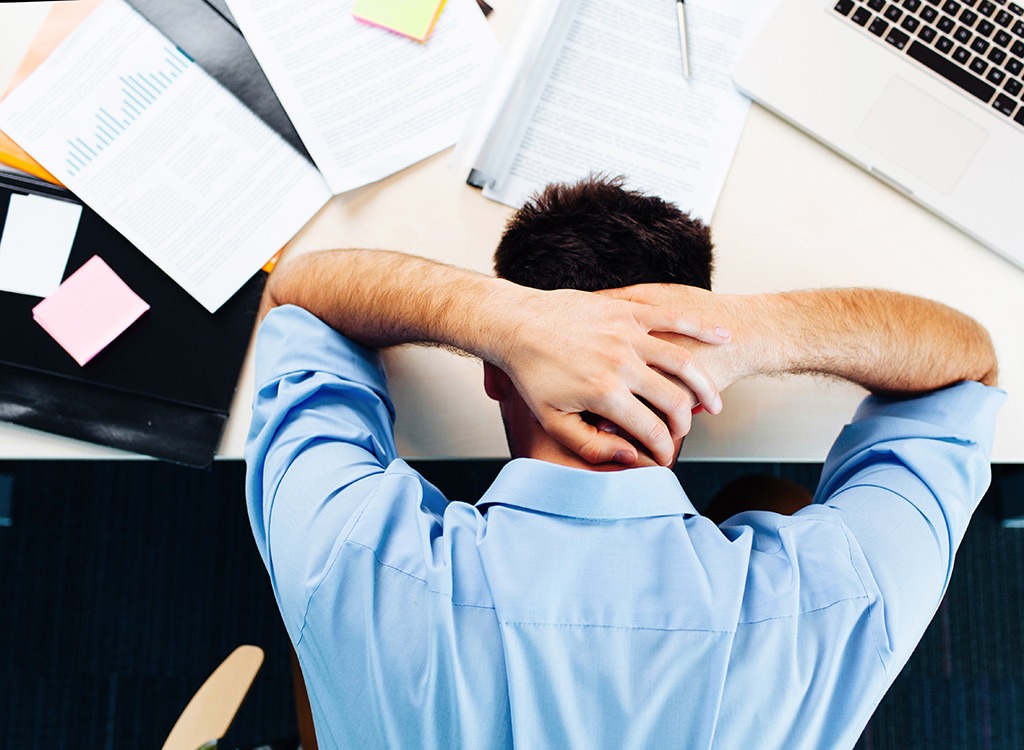Crazy Things Your Stress Does to Your Body, Say Top Experts

If you could choose just one word to summarize your experience over the past year, what would you pick? A lot of colorful terms likely come to mind, but "stressful" has got to be close to the top of the list. But even before the COVID-19 pandemic descended on us in 2020, chronic stress had been linked to a number of adverse—and well-known—physical and mental conditions for quite some time. They include things like insomnia, stomach indigestion, anxiety, and depression. Sure enough, reports of increased rates of those very symptoms have continued to pour in as the pandemic has worn on.
But there are other symptoms associated with stress that you may not be aware of. In fact, they may totally surprise you. Keep reading to learn about some of the more surprising effects of being stressed out, according to several top experts. And for at least one trick that will make you feel better when you're stressed, make sure you're aware of The One Thought You Should Think About When You're Stressed, According to a New Study.
Stress can change how you perceive pain.

Feeling particularly stressed out can actually change how much pain you feel. "One topic that I find myself educating 100% of my patients on is stress, and how this can lead to increased injury risk, as well as increased pain levels," explains board-certified physical therapist Joseph Rayner, IV, PT, DPT. "We tend to think that pain is dictated by the amount of physical harm one endures, but in reality, this is dictated by how nerve signals are interpreted by the brain and are transmitted throughout the body."
The influence of stress on feelings of pain is complex and still not entirely understood. Depending on the situation and level of stress, some test subjects say they feel less pain while others report more intense pain. Generally, though, chronic or long-term stress is believed to induce more pain sensitivity in most cases, whereas acute stress is linked to greater pain resistance in the moment. And if you're feeling the effects of stress, make sure you're avoiding The Worst Foods to Eat When You're Stressed Out, According to Science.
Manageable stress can keep you sharp.

Hold on, can stress seriously be a good thing? It's hard to believe, but recent research by Penn State found that some adversity and stress in life promotes stronger cognition and thinking skills. Among a group of volunteers, those who reported dealing with zero daily stressors most days performed worse on a cognition test than their more stressed-out peers.
"It's possible that experiencing stressors creates opportunities for you to solve a problem, for example, maybe fixing your computer that has suddenly broken down before an important Zoom meeting," explains PSU professor David M. Almeida, a co-author of that study, published in Emotion. "So experiencing these stressors may not be pleasant but they may force you to solve a problem, and this might actually be good for cognitive functioning, especially as we grow older."
A life entirely devoid of stress may sound relaxing, but it would also get boring pretty fast. Too much stress is almost always a negative, but the occasional stressful event or challenging problem keeps us on our toes and breaks up the dullness of the status quo.
Stress can keep your mouth moving all night.

Difficulty falling or staying asleep is one of the most common effects of too much stress. On an evolutionary level, stress tells our bodies to tense up and get ready for action. So, not exactly ideal for drifting away to dreamland. Even if you do manage to fall asleep, all that stress can keep your mouth moving while you're snoozing in the form of teeth grinding and clenching.
"When you do manage to get sleep, the quality becomes significantly diminished as stress will cause jaw muscles to involuntarily tense up and fill the night with non-stop teeth clenching. This issue may not be a big deal in itself but frequent occurrence will lead to serious dental problems and jaw muscle strains," comments McKenzie Hyde, a certified sleep science coach.
Stress can ramp up procrastination.

Like covering your eyes during the climax of a horror movie, feeling overwhelmed by stress can cause many people to run from their problems and responsibilities. Of course, this only worsens and intensifies stress and anxiety in the long-run.
This tendency to procrastinate while stressed is rooted in good biological intentions. Your body and mind want to protect you, and that means avoiding stressors. Ultimately, a much better way to lower stress levels is to tackle whatever's on your plate that day.
However, stress can also increase motivation.

Stress impacts different people in different ways. While a stressor may make one person shut themselves off from the world and binge-watch TV, others use stress to get up and get moving. If stress is kept to a manageable level, it can act like nature's healthy energy drink. "When stress is at a happy-medium, it can help us strive toward our goals in a way that is energizing and fulfilling. On the flip side, stress can take a toll both physically and mentally when it is more intense than the resources we currently have to cope with it," says licensed psychologist Alexandra Emery, Ph.D.
Stress can weaken your bones.

Chronic stress can do a number on your bone density and osteoporosis risk. When we're stressed, our bodies release the stress hormone cortisol. Well, cortisol makes it harder for bones to absorb calcium. Low levels of calcium over an extended period will almost certainly lead to a loss of bone density and strength. Moreover, this study published in Frontiers in Endocrinology reports elevated cortisol levels even inhibit the creation of new bone-building cells (osteoblasts). And if you're feeling the harsh side effects of too much stress these days, know that Spending $5 On This Will Provide You With Instant Happiness, Says Science.








